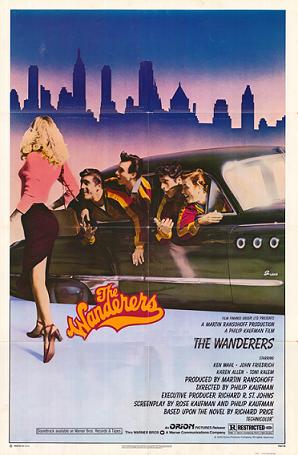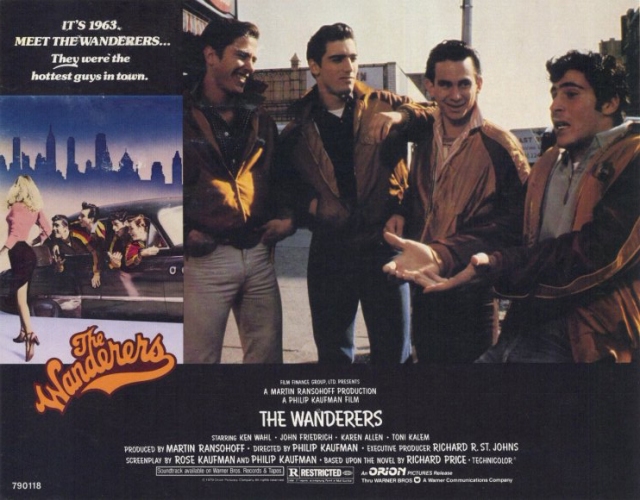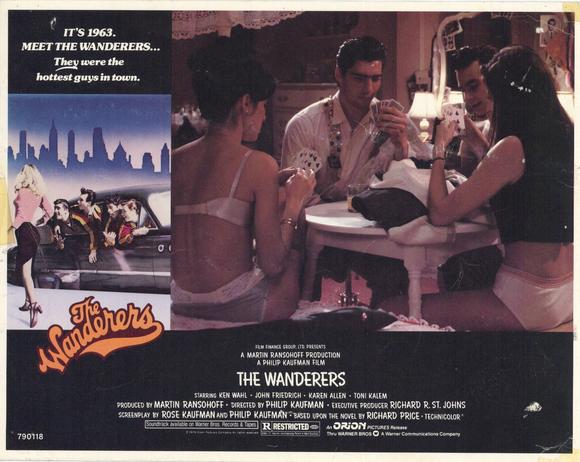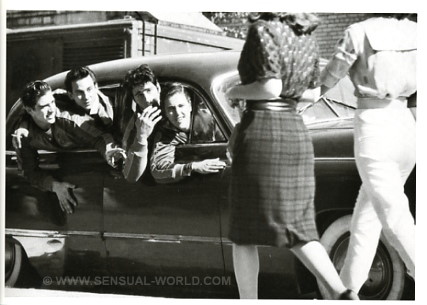
Richard Price’s first novel “The Wanderers” was published in 1974, when he was twenty-four years old. Price knew the territory having grown up in the housing projects of The Bronx. It was a period just before the Assassination of JFK, before Vietnam was on the front page of every newspaper and before the Beatles. The episodic novel focuses on an Italian-American gang, “The Wanderers” led by Richie Gennaro (Ken Wahl). Price’s Bronx is overflowing with gangs, among them the Del Rays, the Fordham Baldies, the Wongs and the stunted Irish bat wielding wild men, the Ducky Boys. Phillip Kaufman’s 1979 film version, while diverting from it source novel in many respects, similarly focus’ on a series of descriptive scenes centering on Gennaro and his fellow Wanderers. Though they wear matching satin jackets, they are not so much a gang as they are a union of close friends hanging out on street corners, chasing girls and protecting themselves from the more dangerous gangs of the Bronx neighborhood they live in. This inner city coming of age film sparkles intermittently while managing to unfortunately derail itself at times with arty self-consciousness.
Statistically the sixties began in 1960 however, the mood, the essence, the spirit of the sixties began in 1963; the year it all began to change. At this point in time, the radio was still filled with American Rock and Roll; artists like Dion, The Contours, The Four Seasons, The Shirelles and The Isley Brothers ruled the Billboard charts. Guys hanging out on street corners singing doo-wop, watching the girls walk by, sizing them up, planning how to cop a feel by “accidentally” bumping into them.
 The film’s focus is on four of The Wanderers, Richie, Joey (John Friedrich), Perry (Tony Ganios) and Buddy (Jim Youngs). Though the screenplay, written by Philip and Rose Kaufman, is as episodic at Price’s novel, the film never goes much beyond the boys’ current life and does not reveal any dreams or aspirations they may have beyond their present existence. In his novel, Price ventures to suggest what the future could offer, what they as individuals, want out of life beyond hanging out on the Grand Concourse and Fordham Road. True, Joey and Perry drive off to San Francisco at the end however; they do not seem to have any plans other than to get out of their current individual situations. The boys’ families are dysfunctional, Joey, an artistic type, is brutalized by his over macho father, Emilio (William Andrews), and Perry (Tony Ganios), a new kid on the block, just moved from New Jersey, has an alcoholic mother who sleeps around. As for Richie, he seems destined to marry his recently knock-up girlfriend Despie (Toni Kalem) and live a life of eating pasta and wearing Hawaiian shirts, similar to his Mafia like future father-in-law.
The film’s focus is on four of The Wanderers, Richie, Joey (John Friedrich), Perry (Tony Ganios) and Buddy (Jim Youngs). Though the screenplay, written by Philip and Rose Kaufman, is as episodic at Price’s novel, the film never goes much beyond the boys’ current life and does not reveal any dreams or aspirations they may have beyond their present existence. In his novel, Price ventures to suggest what the future could offer, what they as individuals, want out of life beyond hanging out on the Grand Concourse and Fordham Road. True, Joey and Perry drive off to San Francisco at the end however; they do not seem to have any plans other than to get out of their current individual situations. The boys’ families are dysfunctional, Joey, an artistic type, is brutalized by his over macho father, Emilio (William Andrews), and Perry (Tony Ganios), a new kid on the block, just moved from New Jersey, has an alcoholic mother who sleeps around. As for Richie, he seems destined to marry his recently knock-up girlfriend Despie (Toni Kalem) and live a life of eating pasta and wearing Hawaiian shirts, similar to his Mafia like future father-in-law.
The film is successful in spots, particularly the opening scenes where Kaufman’s camera gloriously flows over The Bronx from above, fluidly moving down in front Alexander’s Department store to focus on the pug faces of the Fordham Baldies, all to the beat of The Four Seasons “Walk Like a Man.” Another finely realized scene is the strip poker party Richie orchestrates with Joey. The girls, Despie and a new girl Nina (Karen Allen), from the right side of the tracks, are set up to lose both the game and their clothes. There is a mischievous comic interplay between the four characters, the girls begin to catch on that the game is rigged, that is executed more naturally than anything else in the movie.
 Unfortunately, the film goes off course in other scenes, particularly when Kaufman films a bizarre atmospheric episode where Richie and his friends spot Nina walking down the street and follow her in Perry’s car. They end up in an eerie fog filled, oddly lit world controlled by the bat swinging Ducky Boys. It is such a strange out of context scene that I almost expected one of the Wanderers to say, “I don’t think we’re in The Bronx anymore, Toto” as they drive deeper into this strange Oz like landscape gone wrong. Outnumbered, the four are beaten up, though they eventually manage to escape the villainous Ducky Boys.
Unfortunately, the film goes off course in other scenes, particularly when Kaufman films a bizarre atmospheric episode where Richie and his friends spot Nina walking down the street and follow her in Perry’s car. They end up in an eerie fog filled, oddly lit world controlled by the bat swinging Ducky Boys. It is such a strange out of context scene that I almost expected one of the Wanderers to say, “I don’t think we’re in The Bronx anymore, Toto” as they drive deeper into this strange Oz like landscape gone wrong. Outnumbered, the four are beaten up, though they eventually manage to escape the villainous Ducky Boys.
New York City, like many big cities, was inundated with youth gangs in the 1950’s and early 1960’s. Price, in his novel, and Kaufman likewise in the film, used the names of real gangs from those bygone days. The Fordham Baldies (the real gang did not shave their heads), The Ducky Boys, and The Wanderers were all real and violent gangs. Unlike “The Warriors”, released earlier the same year, “The Wanderers” is not so much about gangs as it is about coming of age, in a more innocent time that was on the verge of extinction. We see the dawn of a new age (of Aquarius?) in various scenes. The Vietnam War, though never mentioned, is symbolized by the foreboding Marine recruiter who suckers some of the Baldies into signing up. The assassination of John F. Kennedy is viewed by Richie as he passes by a department store window with a TV broadcasting the news on the President’s death. During his bachelor party in Little Italy, Richie spots Nina and follows her a few blocks to Folk City where a young Bob Dylan is performing “The Times They Are A- Changin.’” Nina enters the club meeting some friends while, Richie uncertain remains outside. He turns and leaves returning to his party and the familiar world he knows. These scenes may be a bit obvious and even heavy-handed but they do convey an emotion that our lives will no longer be as innocent and carefree as they once were.
Richard Price, as I am sure many know, is one of our grittiest and best novelist and screenwriters. His novels include “The Ladies Man”, “Bloodbrothers”, “Clockers”, “Freedomland”, and most recently “Lush Life.” His screenplays include “Sea of Love”, “Clockers”, “Shaft”, “Mad Dog and Glory”, “Night and the City” and “The Color of Money.” Price also wrote the music video “Bad” for Michael Jackson, which was directed by Martin Scorsese.
 The cast was filled, at the time, with talented unknowns. This was Ken Wahl’s first film; he would later star as Vinnie in Stephen Cannell’s TV series “Wiseguy.” Karen Allen, of course, would hit it big in “Raiders of the Lost Ark.” Toni Kalem would later appear in “The Sopranos” as Angie Bonpensiero, Big Pussy’s wife. I especially found Wahl’s characterization of Richie and Toni Kalem’s, Despie the real highlights along with EricVan Lidth De Jeude who played Terror, the gigantic intimidating 350 pound, 6’6” imposing leader of the Baldies. Terror’s girlfriend was played by 4’ 10” Linda Manz. In filming the couple, polar opposites in size, Kaufman’s camera presents an idiosyncratic Fellini like images of the two.
The cast was filled, at the time, with talented unknowns. This was Ken Wahl’s first film; he would later star as Vinnie in Stephen Cannell’s TV series “Wiseguy.” Karen Allen, of course, would hit it big in “Raiders of the Lost Ark.” Toni Kalem would later appear in “The Sopranos” as Angie Bonpensiero, Big Pussy’s wife. I especially found Wahl’s characterization of Richie and Toni Kalem’s, Despie the real highlights along with EricVan Lidth De Jeude who played Terror, the gigantic intimidating 350 pound, 6’6” imposing leader of the Baldies. Terror’s girlfriend was played by 4’ 10” Linda Manz. In filming the couple, polar opposites in size, Kaufman’s camera presents an idiosyncratic Fellini like images of the two.
The soundtrack is filled with early sixties hits, highlighted by two of Dion’s greatest, “The Wanderer” and “Runaround Sue.” Kaufman’s uses the soundtrack not just as an excuse to sell albums; his choices compliment the visuals as effectively as Scorsese did in “Mean Streets” a few years earlier. The use of “Walk Like a Man” at the beginning of the film where we first are introduced to the Fordham Baldies is a highlight. The pounding beat Dion’s “The Wanderer” is the Italian-American gang’s national anthem.
“The Wanderers” was released about six months after “The Warriors” and was unfairly compared to Walter Hill’s gang infested adventure with a New York City over ridden with gangs. What “The Wanderers” does is capture a moment in time, not always very successfully, but in spirit, a time when the innocence of a nation was about to end and we and The Wanderers were about to grow up.
Who doesn’t love “The Wanderer” and “Runaround Sue”? Indeed, John, I must say I’m on the same page with you when you say here:
“Price’s novel, the film never goes much beyond the boys’ current life and does not reveal any dreams or aspirations they may have beyond their present existence.”
Kaufman has always been a problematic director, whose works are alternately insightful and static, and cohesion is always as issue as it is in his most acclaimed feature, THE UNBEARABLE LIGHTNESS OF BEING. But I agree with you that the mood, spirit and locations are often right here, and the misic is infectious.
Again your command of the historical aspects of the film and its stars is outstanding as is your firm grasp on it’s considerable failings.
But ah, that music.
LikeLike
Sam – Dion is one of my favorite singers. He has actually had an interesting career, doo-wop with The Belmonts, his solo years as a rock singer, then transitioning to folk music in the late sixties, moving to Christian music and back to rock and roll and the blues. We have seen him in concert five times over the years.
The music is used real well in this movie and like you say, it is infectious. I agree with you on Kaufman, you want to like his work and there is much to like, but he does not seem to be able to make a completely satisfying film, nor a completely bad one. Well, wait, I take that back, if you ever saw “Twisted”, you would know he is capable of making a completely bad film.
LikeLike
Ha ha John! I actually never saw TWISTED, but I’ve heard as much!
Yep, I agree with you on Dion. You are a real fan there. FIVE TIMES!!! That’s devotion.
LikeLike
John – Great review with your usual historical tie-ins and background. Your writing on the films themselves is outstanding, but as Sam said, the way that you comment on the historical aspects and settings of the films is just as good!
I haven’t seen this film, but even with some of the issues that you and Sam have mentioned, I’m still intrigued. The music you guys are discussing is great, and plus I’m just fascinated by the time period and setting the movie takes place in.
LikeLike
I can’t think of much to add, but just want to say that I enjoyed reading this – and, after watching many gangster movies from earlier eras, think it would be interesting to see how gangs evolved later. Keep up the good work, John. Hope this makes sense, I’ve just crawled home from a late night at work…
LikeLike
Dave- as usual thanks for your input. I think you would like the film if you get the chance. I am sure right now you are tied up with you countdown project.
Judy – thanks for the kind words. Hope you get a break from the late hours on the job. The gangs in this film are more teenage gangs probably similar to the teddie’s I read about when reading about The Beatles early days.
LikeLike
i actually lived there and during that erea.
it was my youth like it or not..
oddly enough there are web sites that people write to .but 99 % of the details are gone .. no one really cares ..
every one wwnt on with there lives and just forgot there past..
LikeLike
I really enjoyed the summary
LikeLike
I really enjoyed the film and you summary John. Do you have a take on the importance of Perry as a character? He isn’t given a huge role, but there are times when I am magnatized to him in a scene, and feel like there is a specific undertone. Thanks for your summary, let me know what you think.
LikeLike
Kyle,
To me Perry is good hearted, protective of his friends and stuck with a rotten mother. In the end he decides to get out, willing to try life on his own.
LikeLike
I know it has its faults and I don’t care — I just love this film. Always have. Wanderers forever.
LikeLike
Don’t blame you Deborah Jane! The film is a great look at a time now lost in the past. Though there were gangs and sex, the teens of the day were a lot more innocent than today. And the music was great!
LikeLike
Nice review John. I appreciate your writing on the film and surrounding music and history. My father grew up In the Bronx and mentioned the Fordham Baldies a few times over the years as a tough gang that was feared by him and his friends, though they never had a run-in. Interesting, your note about the Ducky Boy scene during their chase with Nina’s car. Though the two movies are completely different, I think this scene may show a slight fantasy parallel with Walter Hill’s ‘Wanderers’, in the way it morphs from daytime realism to a dark-lit, fog-filled atmosphere in the tunnel encounter with the Duckies. (I think it’s a tunnel). I have always enjoyed the depth and feeling of The Wanderers much more than the one-dimensionality of The Warriors, but I’ve just recently developed a bit more appreciation for the latter after reading this interview with Walter Hill:
http://www.esquire.com/blogs/culture/the-warriors-walter-hill-interview
Wondering what are your thoughts, if any, on this interview, and comparing/contrasting the two films?
LikeLike
Luigi,
Thanks for stopping by and for your thoughts here. Admittedly, I did not care for “The Warriors.” To me, it just seemed like NYC was just overtaken by gangs and nowhere was safe. I think you hit it right when you say the film is “one dimensional.” Though not completely successful, “The Wanderers” has some depth to it, and captures, at least in the first half, a sense of time gone by. Hill’s interview is interesting. I found it surprising that the novel his film was based on was written about 15 years earlier which would put it in time and place around the same era as “The Wanderers.” Hope to hear from you again.
LikeLike